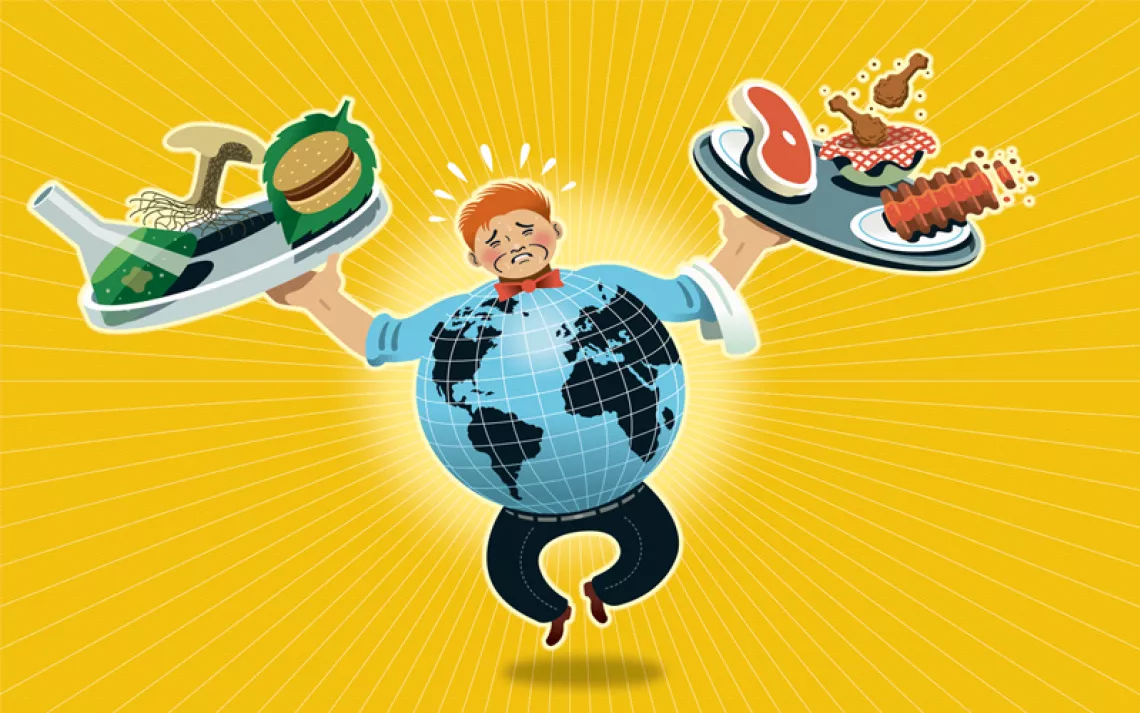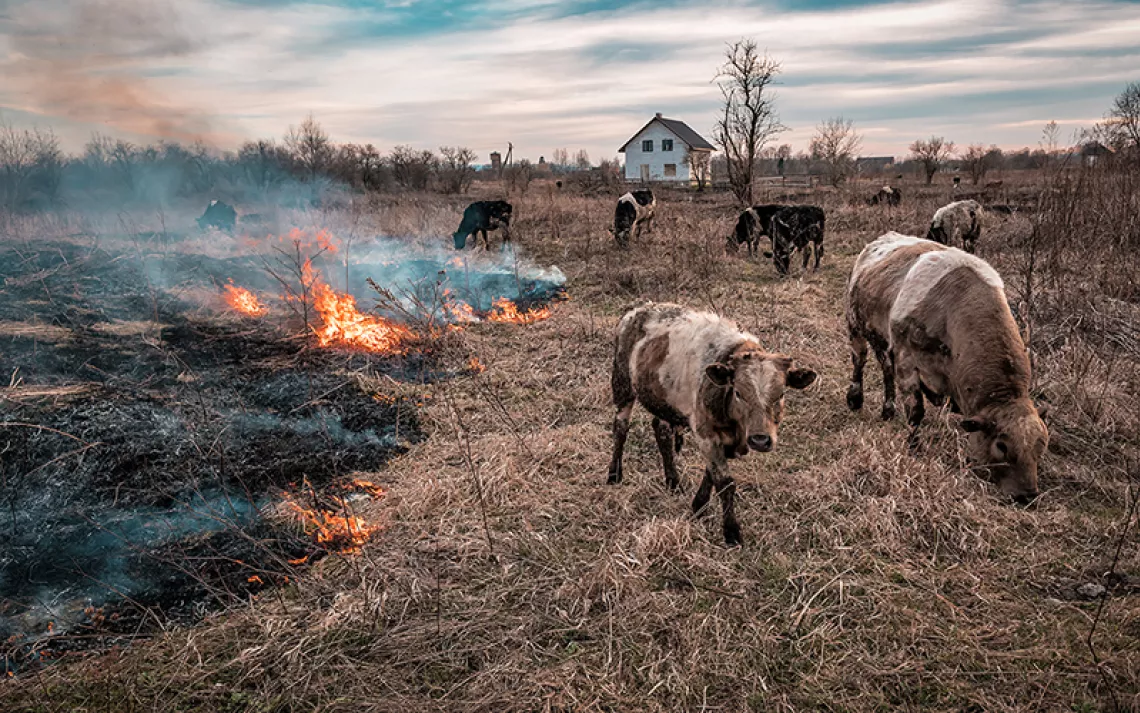8 Ways to Start Easin' Into Vegan
Resolve to make your diet more plant based in 2019
For a potent New Year diet motivator, look no further than October’s doomsday report from the United Nations Intergovernmental Panel on Climate Change. High among its prescriptions for limiting global sea level rise and climate disruption is an advisory for humanity to reduce its collective consumption of animal products by at least 30 percent. After all, between the feed production required to raise cattle and other livestock and these animals’ massive release of methane, animal agriculture harms the climate more than the combined emissions from every plane, train, car, bus, and boat in the world.
Luckily, it’s gotten a lot easier to find satisfying alternatives to meat and dairy products. What’s more, doing so could really boost your personal and pocketbook health. California’s Oakland Unified School District, for example, reduced meat and dairy purchases by 30 percent over a period of two years, shrunk its carbon footprint by 14 percent, and saved $42,000 annually.
Like OUSD, you don’t necessarily need to take the “zero to hero” approach and go full vegan overnight. “Changing your entire lifestyle overnight is far less likely to be sustainable, compared to making smaller changes over the course of a few weeks,” advises nutritionist Maleah Staton. “Start with the animal products you enjoy or eat the least, and cut those out. Finding substitutes for the products you use most often, or going half and half on a meat-and-plant-based protein dish can be helpful when it comes to making smaller, more sustainable changes.”
We’ve compiled a list of campaigns, mantras, and communities that’ll help ease your transition into a more plant-based lifestyle. Simply designating a couple days a week for plant-based eating (see Meatless Monday and Freestyle Friday) and/or taking strides to become more intentional about your diet (check out VB6 and OMD) will go a long way toward helping you and your family take a bite out of climate change in 2019.
Meatless Monday: Research shows that Monday is the easiest day to commit to small, health-forward changes. Ergo Meatless Monday, a campaign that harks back to the First and Second World Wars, during which the US government urged Americans to reduce consumption of key staples to aid the war efforts. More than 13 million families pledged their commitment to Meatless Monday (as well as Wheatless Wednesday). In 2003, the former was revived by ad man turned health advocate Sid Lerner, in association with the Johns Hopkins Bloomberg School of Public Health, with the goal of reducing global meat consumption by 15 percent. The premise is simple: One day a week, cut the meat. Monday Campaigns provides information, news, recipes, and free promotional materials to help individuals, schools, restaurants, hospitals, companies, and entire municipalities—the New York City Council is presently considering a resolution to officially recognize Meatless Monday. Food providers including Aramark and Sodexo are on board, as are major chain restaurants like Subway and Chipotle. Now in its second decade, Meatless Monday is embraced in more than 40 countries and feted in 20 languages. Consider this a straightforward way to commit to 52 meat-free days each year.
Freestyle Friday: In a throwback to the Catholic and Eastern Orthodox tradition of abstaining from animal meat on Fridays, consider jump-starting plant-based eating plans on Fridays. “This way, it carries into the weekend, when people have more time to plan their meals, cook, and be mindful of their eating habits,” says nutrition consultant Stacy Goldberg. “Hopefully it also makes for less weekend indulgence!”
VB6 (Vegan Before 6): When New York Times food columnist Mark Bittman found out he had pre-diabetes, pre-heart disease, and high cholesterol, he embarked on a mostly plant-based diet: He’d eat vegan meals and snacks before 6 P.M., and at night enjoy whatever he wanted. That way, Bittman figured, he wouldn’t let the perfect be the enemy of the good, and he’d still get to dine out and indulge in favorite foods. In 2013, Bittman turned his new lifestyle—which helped him lose weight and avoid taking medication—into a best-selling book in which he shares more about his non-diet “diet,” as well as his go-to plant-based meals. Consider it a system fit for the environmentalist who just can’t live without cheeseburgers—but who can wait for them until dinnertime.
Weekday Vegetarian: In a similar vein, Treehugger.com founder Graham Hill delivered a 2010 TED Talk in which he argued that eating no meat from Monday through Friday carried potent personal, economic, and societal benefits, carnivorous weekends be damned. Hill has since expanded the talk into a digital book that includes a full range of veggie recipes to get weekday vegetarians rolling.
OMD (One Meal a Day): The semi-recent brainchild of Suzy Amis Cameron (environmental advocate and founder of California’s MUSE School, the first school in the nation with a plant-based lunch program), OMD is a campaign (and as of last October, a book) that asks people to commit to one plant-based meal a day. A good fit for the resolution-maker who benefits from community and accountability, OMD’s site provides plenty of free guides, including a Restaurant Toolkit to help advocate for more plant-based changes in local restaurants and delivery services, and a School Lunch Campaign to support climate-friendly food services in schools. Its social media channels make it easy to swap tips and link up with fellow food system changemakers.
Veganuary: Eight days late is better than never! Absolutist eaters might enjoy the challenge of pledging to a month-long commitment to veganism. It’s as simple as it sounds: Pledge online, receive a (free) vegan starter kit and membership into social media support groups, and you might just love how good you feel and stick with it. In which case, we wish you a very happy twenty-nine-teegan!
The Reducetarian Diet: The minds behind the Reducetarian Foundation believe that in addition to sparing farm animals, protecting the environment, and improving human health, by reducing overall consumption of animal products, we can also make a dent in world hunger. Think about it: If all food crops were fed directly to humans instead of animals, we’d have about 70 percent more to go around—enough to feed the world’s malnourished more than four times over. It’s why the foundation works to promote Reducetarian college campus clubs, brings together influencers and organizations that share a mission to end factory farming and significantly reduce societal consumption of animal products, and throws a yearly summit to further increase collaboration. If you've always wanted to go to Los Angeles and help make a niche lifestyle more mainstream, this could be the movement for you.
10 Weeks to Vegan: Feeling inspired to take the plunge into full-time veganism? Check out this free guided challenge, care of Vegan Outreach, a nonprofit that’s been working to end violence toward animals since 1993. Sign up, and you’ll receive weekly emails chock-full of tips for the switch from vegans-in-the-know, easy recipes, nutrition information from registered dieticians, and more motivation. Godspeed to all you nascent vegans out there! And happy plant-powered New Year.
 The Magazine of The Sierra Club
The Magazine of The Sierra Club




